Index relies entirely on the support of donors and readers to do its work.
Help us keep amplifying censored voices today.
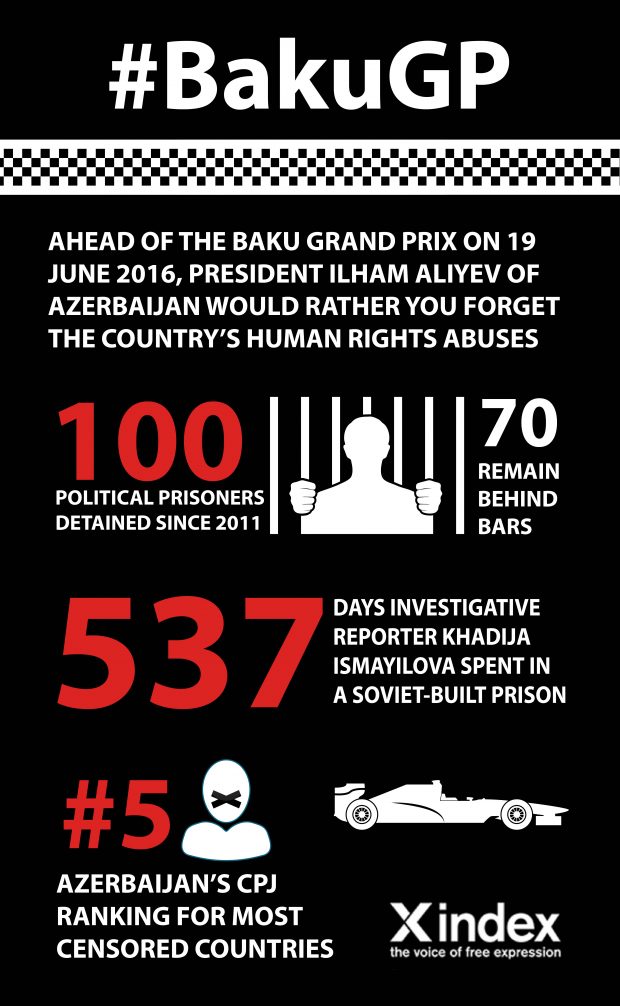
“Having seen the development work in Baku as it’s neared completion over the past few months, it’s clear that the organisers have put a lot of planning and resources into the infrastructure around the circuit, and it promises to be a very significant event in the region.” So said Fernando Alonso, Formula One double World Champion and “Baku Ambassador” ahead of the European Grand Prix on the streets of the city on 19 June.
In his ambassador role, Alonso observed the progress being made on the streets of the Azerbaijani capital during an 8-9 March visit. What he almost certainly didn’t observe was the dire human rights situation in the country that has seen an assault on fundamental freedoms and attempts to silence critical voices.
The reason he wouldn’t have seen such abuses is because the Azerbaijani government has gone to great lengths to make the country appear as law-abiding and democratic in an attempt look legitimate and draw foreign money.
Azerbaijan has previously hosted other significant sports and cultural events — including the inaugural European Olympic Games in 2015 and the Eurovision Song Contest in 2012 — but as son of the country’s sports minister, Aria Rahimov, said, the upcoming Grand Prix is an opportunity “to promote our city from different points: from the touristic point of view, investment”.
There are many things President Ilham Aliyev’s autocratic regime, which has been in power since 2003, would rather we didn’t promote. Here are just three.
His government has:
1) Imprisoned journalists, activists and opposition politicians.
Over 100 political prisoners have been detained since 2011, when during the Arab Spring the country’s rulers feared an uprising at home. Around 70 of these prisoners remain behind bars.
Azerbaijani investigative journalist Khadija Ismayilova may have been released from prison last month, but two trumped-up charges against her — illegal entrepreneurship and tax evasion –remain. Her seven-and-a-half-year jail sentence has only been reduced to a three-and-a-half-year suspended term and she isn’t free to leave the country.
Many others, including journalist Seymur Hezi, are still serving prison sentences on charges that were widely condemned for being politically motivated to silence outspoken critics of the government of President Aliyev.
2) Led a crackdown on independent media outlets.
The Committee to Protect journalists lists Azerbaijan as the fifth most censored country in the world, ahead of Iran, China and Cuba. The ranking is in part due to the lack of independent media as “offices have been raided, advertisers threatened, and retaliatory charges such as drug possession levied against journalists”.
Azerbaijan’s independent media is under attack more than ever before. Most recently, editors of the Index award-winning opposition newspaper Azadliq received a letter from the Azerbaijan publishing house with a warning of discontinuation of the newspaper if it does not pay off its debts before 27 June. Azadliq — widely recognised as one of the last remaining independent news outlets operating inside the country — is convinced that the authorities are deliberately trying to put it out if business.
3) Allowed a climate of violence against critics to fester.
Torture and ill-treatment are widespread against political prisoners. Youth activists Bayram Mammadov and Giyas Ibrahimov were tortured in May 2016, allegedly to draw confessions for trumped-up drugs charges.
Public attacks against journalists are widespread and murder is not uncommon. In 2005, Elmar Huseynov, an independent Azerbaijani journalist, widely known for his harsh criticism of Azerbaijani authorities and president Aliyev, was murdered in outside his home in Baku. In 2011, Rafiq Tağı, who had written an article deemed to be critical of Islam and the Islamic prophet Mohammed was stabbed in a car park near his home, later dying in Baku hospital.
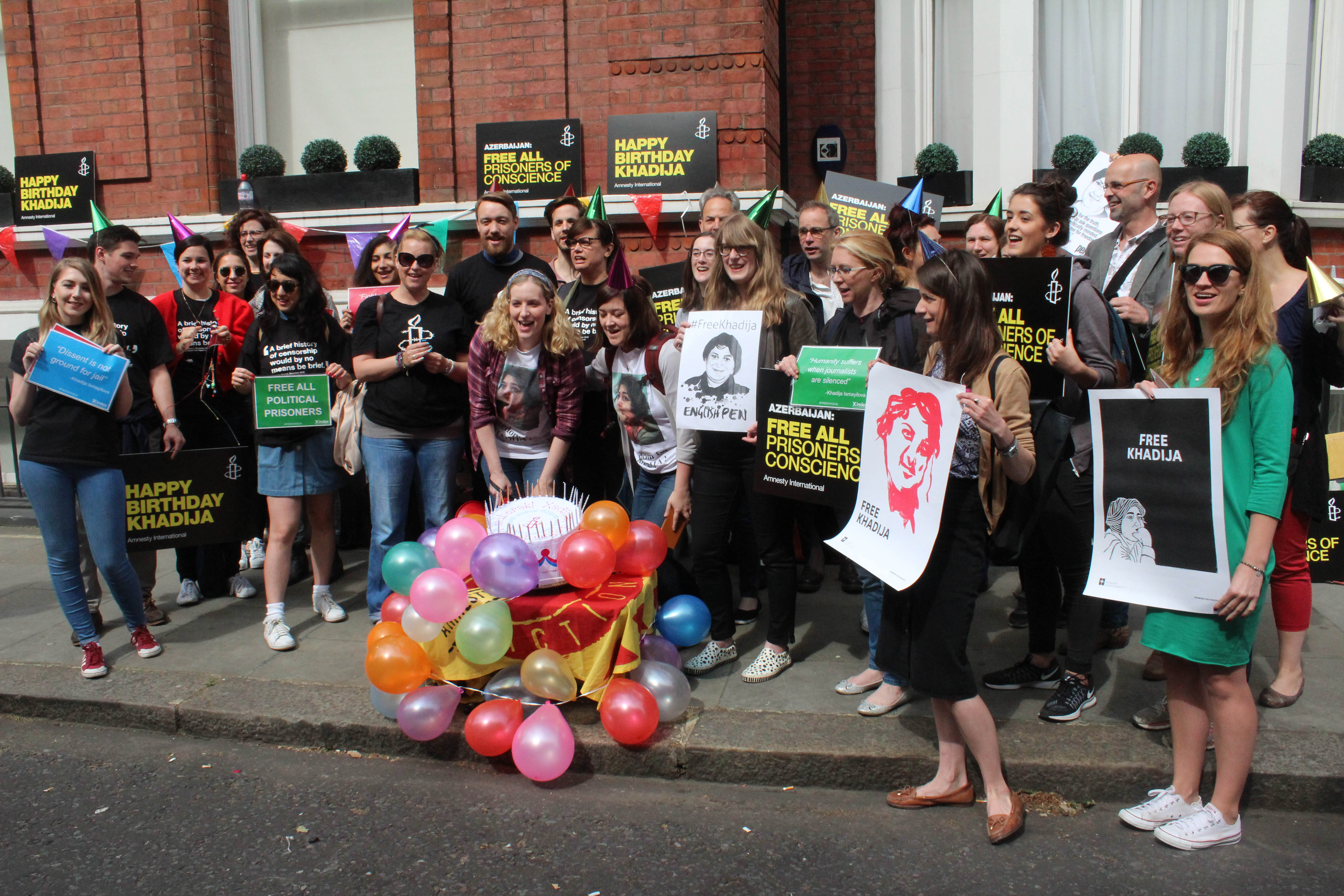
Protest for Khadija Ismayilova, Azerbaijan embassy, London. Credit: Cat Lucas, English Pen
Azerbaijani investigative journalist Khadija Ismayilova may have been released from prison on Wednesday, but two trumped-up charges against her — illegal entrepreneurship and tax evasion –remain. Her seven-and-a-half-year jail sentence has only been reduced to a three-and-a-half-year suspended term and she isn’t free to leave the country.
Today is Ismayilova’s 40th birthday and to mark the occasion, protesters gathered at 40 different demonstrations from around the world, not just to celebrate, but to call for all charges against her to be quashed. Index joined other members of the Sports for Rights coalition at the Azerbaijani embassy in London (see above).
Happy birthday Khadija! pic.twitter.com/FGPlA4Y3xt
— Index on Censorship (@IndexCensorship) May 27, 2016
“Let’s take a moment to celebrate the work that’s been done by this remarkable woman,” Rebecca Vincent, the co-ordinator of the Sport for Rights campaign, told demonstrators.
Currently, around 70 political prisoners — including journalists, bloggers, activists and religious followers — sit in Azerbaijani jails, and Vincent called on protesters to sustain their focus on all of them. “That’s what Khadija has asked for for her birthday,” she said.
Seymur Hezi is an Azerbaijani journalist serving a five-year prison sentence on charges of “aggravated hooliganism”. Hezi, who contributed to the Index on Censorship Freedom of Expression Award-winning newspaper Azadliq, was sentenced on 29 January 2015. He was arrested on 29 August 2014 following an altercation in which the journalist was defending himself from a physical assault and harassment, according to his lawyers. “His case doesn’t get enough international attention, possibly because he is not an English speaker and not well networked,” Vincent said.
Other political prisoners include Ilgar Mammadov, the opposition politician who leads Azerbaijan Republican Alternative Movement, who has been in jail for over three years, and Ilkin Rustemzade, the activistt originally jailed following his Harlem Shake video filmed in Baku.
On the same day Ismayilova was released, two more political prisoners, a youth activist and a journalist, were arrested.
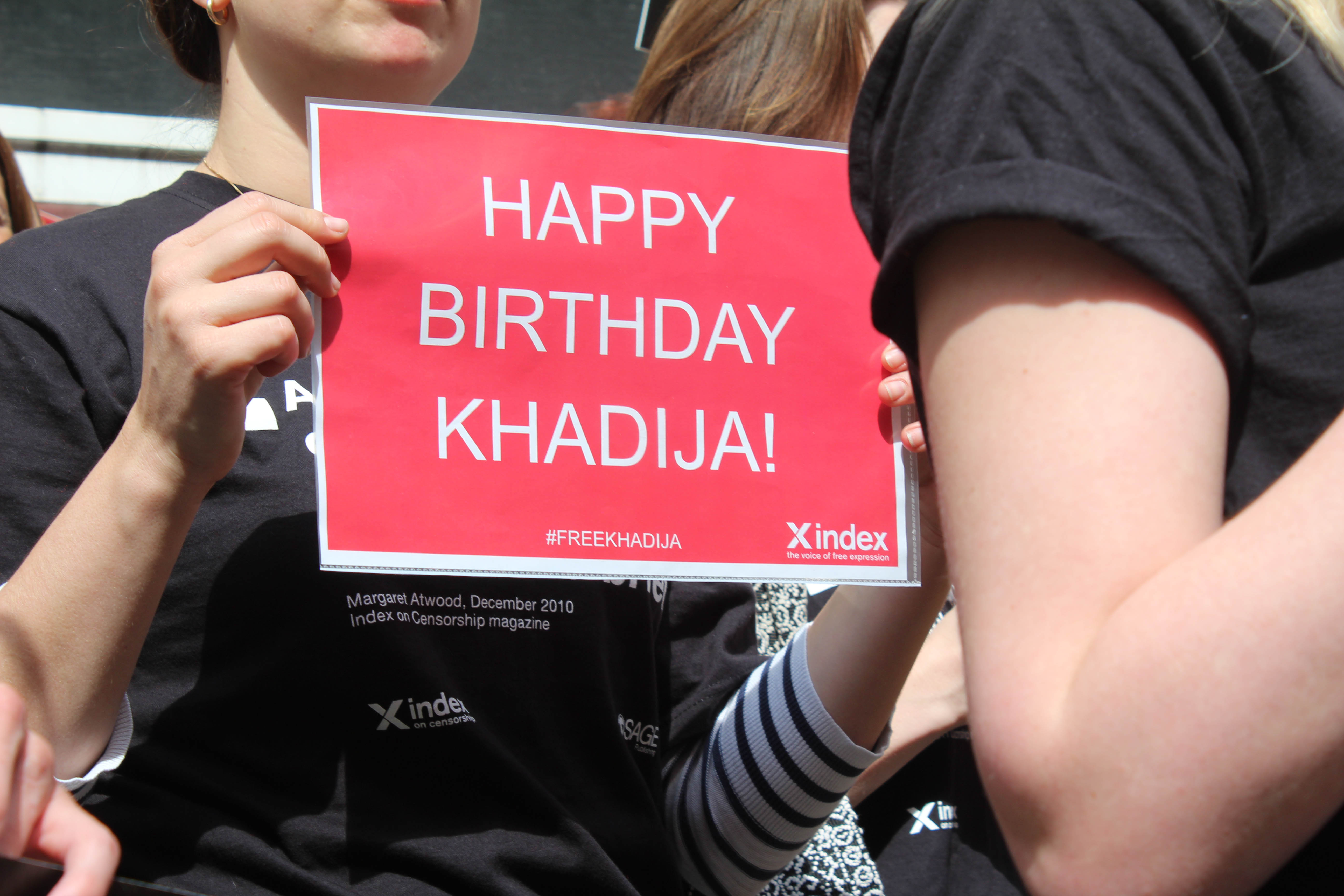
Protest for Khadija Ismayilova, Azerbaijan embassy, London. Credit: Cat Lucas, English Pen
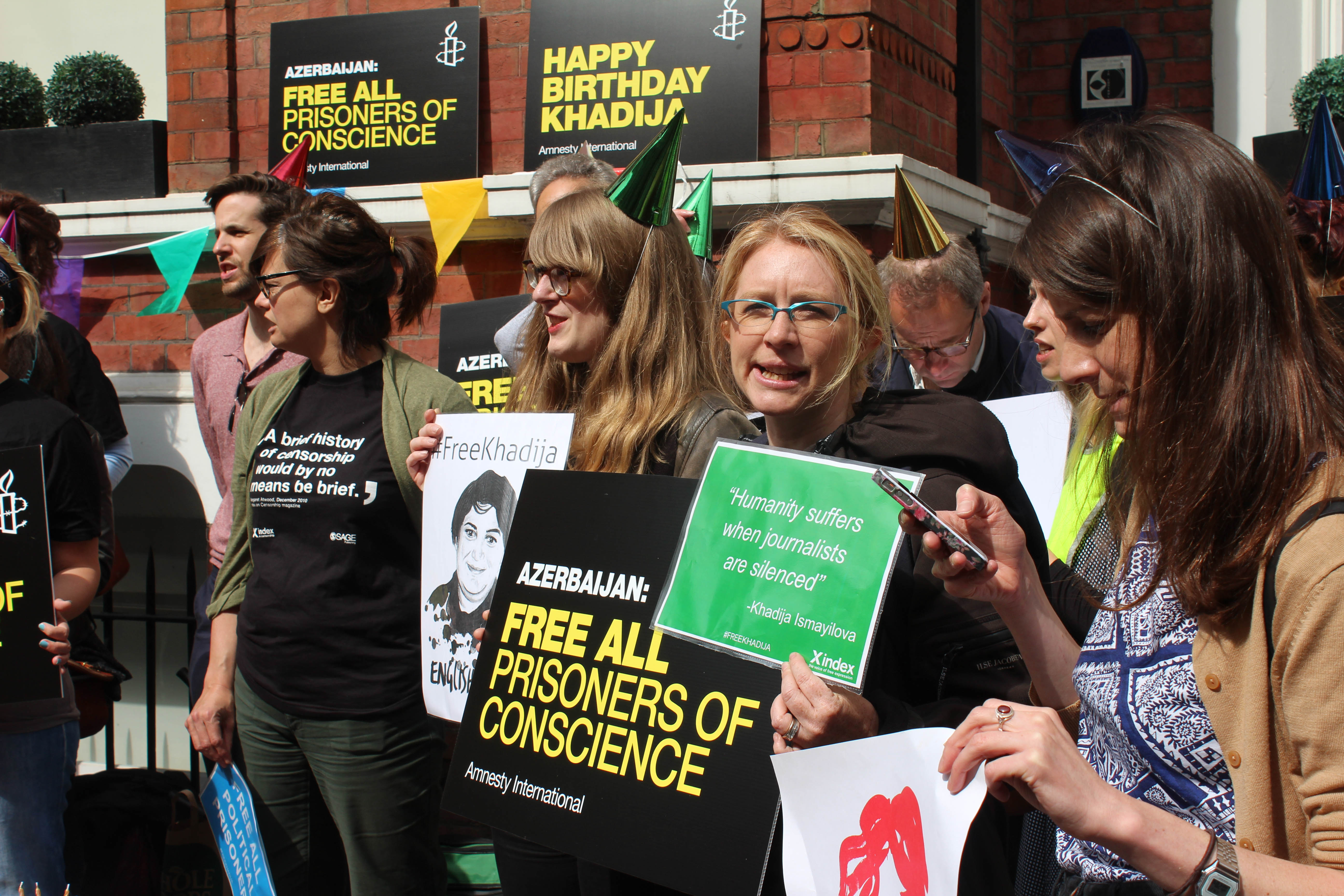
Protest for Khadija Ismayilova, Azerbaijan embassy, London. Credit: Cat Lucas, English Pen
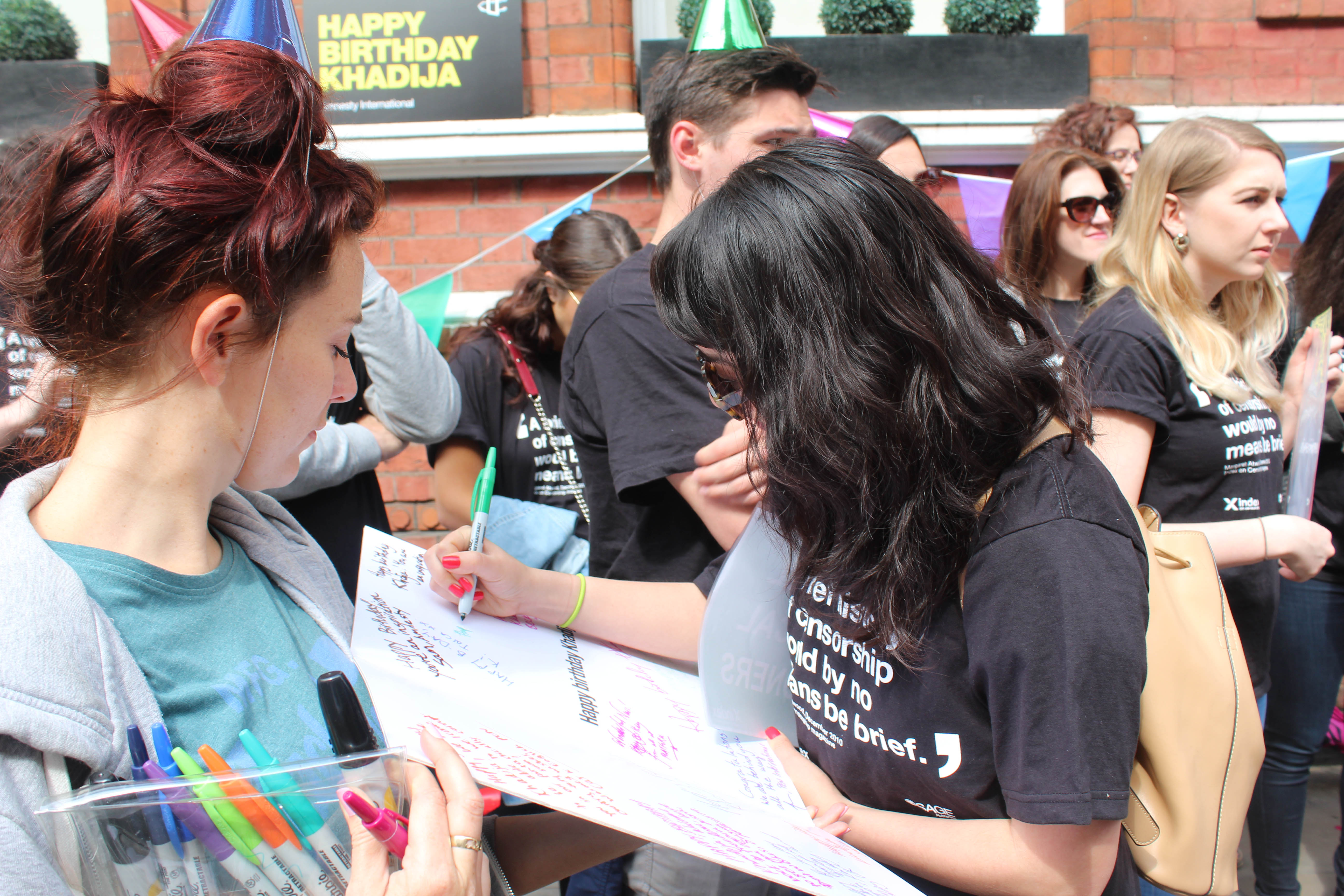
Protest for Khadija Ismayilova, Azerbaijan embassy, London. Credit: Cat Lucas, English Pen
Writing birthday wishes to @khadija_ismayil @melodypatry picks up her pen pic.twitter.com/nNBOsP8h9E
— IndexCensorshipMag (@Index_Magazine) May 27, 2016
Many more protests took place today. Here are some of them:
The #RSF team is celebrating #Khadija‘s birthday in front of the #Azerbaidjan Embassy. Happy bday! https://t.co/h7YEhlEvaV
— RSF (@RSF_inter) May 27, 2016
Thank you @RepMcGovern for joining us to celebrate @Khadija_Ismayil birthday and release! #FreeKhadija pic.twitter.com/sWMaM2z2zw
— Freedom Now (@freedomnoworg) May 26, 2016
Today we celebrate @Khadija_Ismayil but also remember dire #humanrights situation in #Azerbaijan,call #EU for action pic.twitter.com/PYQPLAY1gE
— Alexander Sjödin (@AJSjodin) May 27, 2016
Norwegian journalist Oystein Windstad demands freedom for Seymur Hazi @FrittOrd@SportForRightspic.twitter.com/d4jU6zbvQH
— NHC (@nhc_no) May 27, 2016
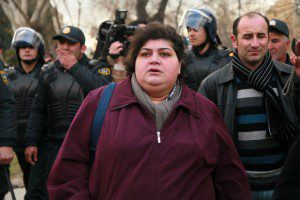 Azerbaijan’s Supreme Court has ordered the release of investigative journalist Khadija Ismayilova. But who is Ismayilova and why was she in prison?
Azerbaijan’s Supreme Court has ordered the release of investigative journalist Khadija Ismayilova. But who is Ismayilova and why was she in prison?
One of Azerbaijan’s most celebrated journalists, Ismayilova investigated, among other things, Azerbaijan’s human rights abuses and the corruption involving the family of president Ilham Aliyev. The recent Panama Papers have followed up on her work, exposing links between the president’s family and a network of offshore tax havens and hidden wealth.
Ismayilova was arbitrarily imprisoned in December 2014 and was sentenced in September 2015 to seven-and-a-half years in prison. Although she is officially charged with large-scale misappropriation and embezzlement, illegal entrepreneurship, tax evasion and abuse of official duties, it is widely believed that the real reason for Ismayilova’s imprisonment is her investigative journalism.
Before her arrest, Ismayilova had been subjected to a relentless campaign of intimidation and persecution, possibly orchestrated by the Azerbaijani authorities to discredit her investigative reporting on corruption amongst the highest levels of society.
“Khadija Ismayilova has suffered a serious invasion of her personal privacy through the installation of hidden cameras and wires in her flat and publication of secretly filmed videos among other incidents. Azerbaijan has a positive obligation to carry out an effective investigation into these violations,” said Camila Graham-Wood, legal officer at Privacy International.
Human rights lawyer Amal Clooney has been representing Ismayilova during her case at the European Court of Human Rights.
Her work was recognised by the United Nations which awarded her the prestigious Unesco/Guillermo Cano World Press Freedom Prize. When Ismayilova was in prison, her mother, Elmira Ismayilova, accepted the award on her daughter’s behalf. She read a statement Ismayilova wrote from prison: “As you gather here tonight, I ask you not to laud my work or my courage, but to dedicate yourself to the work each one of you can do on behalf of press freedom and justice.”
She read a statement Ismayilova wrote from prison: “As you gather here tonight, I ask you not to laud my work or my courage, but to dedicate yourself to the work each one of you can do on behalf of press freedom and justice.” Ljiljana Zurovac, president of the Unesco/Guillermo Cano World Press Freedom Prize 2016 jury, said: “Khadija Ismayilova highly deserves the prize and I am happy to see that her courage and professionalism are recognised.”
Azerbaijan is one of the lowest ranked countries for press freedom, being placed 163 out of 180 countries on the 2016 Reporters Without Border’s World Press Freedom Index.
Protests due to take place this Friday to mark Ismayilova spending her 40th birthday in prison will still go ahead to celebrate her release, call for her full acquittal and for the release of the country’s political prisoners, including Ilgar Mammadov, Seymur Hezi and Ilkin Rustemzade.
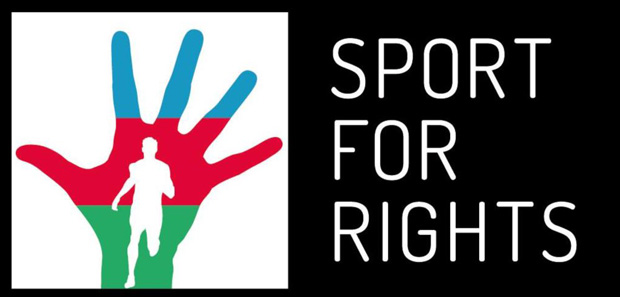
London, 17 May 2016: The Formula One Group leadership should urge the Azerbaijani government to release unjustly imprisoned activists and journalists ahead of the European Grand Prix in Azerbaijan, said the Sport for Rights coalition today.
Azerbaijan will host its first Formula One European Grand Prix race on 17-19 June 2016 in the capital, Baku. The Azerbaijani government has sought to host a number of high-profile sports and other events in recent years, including the inaugural European Games in 2015, while cracking down on human rights activists and critical journalists, as event organisers stayed silent.
“Formula One leadership has a crucial opportunity to press the Azerbaijani government to make concrete steps to improve its human rights record ahead of the Baku Grand Prix”, said Jane Buchanan, associate director for Europe and Central Asia, at Human Rights Watch. “If it remains silent, Formula One risks condoning the government’s efforts to benefit from the prestige of international events, while silencing domestic critics, without consequences”.
Sport for Rights is a coalition of international human rights groups working to draw attention to the dramatic human rights situation in Azerbaijan. The coalition campaigns for the protection of human rights in Azerbaijan and calls on international sporting organisations to press for better human rights safeguards in countries hosting major sporting events.
In recent years, the government of Azerbaijan has undertaken a systematic crackdown on journalists, media outlets, and independent activists. The authorities have arrested or imprisoned dozens on politically motivated charges, including Azerbaijan’s best-known investigative journalist, Khadija Ismayilova, and opposition politician Ilgar Mammadov. The government has also forced numerous independent groups critical of the government to cease operations.
The Formula One Group has explicitly acknowledged its human rights responsibilities, in a policy that states it is “committed to respecting internationally recognised human rights in its operations globally”.
In a letter to Bernard Ecclestone, Chief Executive of Formula One Group, the groups urge Formula One to speak out publicly against the Azerbaijan government’s crackdown on critics and call for the release of those wrongly imprisoned.
“It’s commendable that Formula One group recognises its human rights responsibilities, but the policy has little meaning unless the leadership insists on respect for fundamental human rights protections in the countries that host the Grand Prix” said Rebecca Vincent, coordinator of the Sport for Rights campaign. “If the Azerbaijani government wants the reputational boost of being a global sporting host, it must also recognise its obligations to allow independent media and activists to speak freely, even if it doesn’t always like the message”.
The Azerbaijani government has taken some positive steps in 2016, including releasing at least 16 activists and journalists imprisoned on politically motivated charges. However, many outstanding, extremely serious concerns remain, and the government continues to harass and detain critics, the Sport for Rights coalition said.
In the letter to Formula One Chief Bernie Ecclestone, the coalition called the Formula One Group to take a number of essential steps, including calling on the Azerbaijani authorities to:
The coalition noted that during the 2015 European Games in Baku, the government prevented numerous leading international journalists from covering the Games, without any penalty or consequences from the Games’ organisers.
“Formula One Group has a chance to support the critical voices remaining in Azerbaijan and ensure the Grand Prix doesn’t repeat the human rights failures of the European Games”, said Emin Huseynov, director of the Institute for Reporters’ Freedom and Safety. “By using its unique position, the Formula One group can ensure that the legacy of the Grand Prix in Azerbaijan is not greater repression”.
For more Human Rights Watch reporting on Azerbaijan, please visit:
https://admin.hrw.org/europe/central-asia/azerbaijan
For more information on Sport for Rights, please visit:
https://www.facebook.com/sport4rights/
For more information, please contact:
For Human Rights Watch, in New York, Jane Buchanan (English, Russian): +1-646-644-4847, or [email protected]. Twitter: @JaneMBuchanan
For Human Rights Watch, in Tbilisi, Giorgi Gogia (English, Georgian, Russian): +995-577-42-12-35 (mobile); or [email protected]. Twitter: @Giorgi_Gogia
For Sport for Rights, in London, Rebecca Vincent (English, Azerbaijani): +44 (0)7583 137751 (mobile); or [email protected]. Twitter: @rebecca_vincent
For the Institute for Reporters’ Freedom and Safety, in Geneva, Emin Huseynov (English, Azerbaijani, Russian): +41 (0) 788788428 (mobile); or [email protected]. Twitter: @EminAzerbaijan
Bernard Ecclestone
Chief Executive
Formula One Group
6 Princes Gate
Knightsbridge
London SW7 1QJ
17 May 2016
Dear Mr Ecclestone,
We, the undersigned members of the Sport for Rights coalition, are writing to you in advance of the Baku European Grand Prix in June to provide details on Azerbaijan’s deeply troubling human rights record and steps that we believe Formula One Group can take to ensure its compliance with its human rights responsibilities.
Sport for Rights is a coalition of international non-governmental organisations working together to promote human rights in Azerbaijan. As Azerbaijan hosts and bids to host international sporting events, with the media spotlight, prestige, and reputational boost that those events can bring to a host country, we are consistently calling on international sporting organisations and others to take meaningful action consistent with their human rights responsibilities as well as use the opportunity of sporting events to press for better human rights protections.
In the run-up to the European Grand Prix in Baku, the Azerbaijani authorities have continued with their human rights crackdown to silence critical voices. We urge you to use the European Grand Prix as an opportunity to speak out against the crackdown and call for the release of jailed journalists and activists.
Formula One Group’s Responsibilities
Formula One Group states that it “is committed to respecting internationally recognised human rights in its operations globally”. The policy also states that Formula One Group will take steps to “understand and monitor through our due diligence processes the potential human rights impacts of our activities”, “identify and assess, by conducting due diligence where appropriate, any actual or potential adverse human rights impacts with which we may be involved”, “consider practical responses to any issues raised as a result of our due diligence”, and “engage in meaningful consultation with relevant stakeholders in relation to any issues raised as a result of our due diligence”. Sport for Rights welcomes this explicit acknowledgement and statement of Formula One Group’s human rights responsibilities.
As you will be aware the United Nations Guiding Principles on Business and Human Rights (Ruggie Principles) and the Organisation for Economic Cooperation and Development (OECD) Guidelines for Multinational Enterprises, issued in 2011 both provide that entities such as Formula One Group bear responsibilities to carry out effective human rights due diligence, to avoid contributing to adverse human rights impacts and to address any that arise.
Grave Human Rights Situation in Azerbaijan
As you may also be aware, in recent years, the government of Azerbaijan has undertaken a dramatic crackdown on journalists, media outlets and civil society leaders and independent organisations. Specifically the authorities have:
Recently, the authorities have taken some positive, but limited steps. In March 2016, the authorities pardoned or conditionally released at least 16 human rights defenders, activists, and journalists imprisoned on politically motivated charges. In April 2016, the government also finally allowed leading activist, Leyla Yunus, and her husband, Arif Yunus, to travel abroad for medical treatment. The Yunuses had earlier been released on suspended sentences from prison, where their fragile health conditions had deteriorated precipitously since their arrests on politically motivated charges in 2014, charges levied in retaliation for their activism.
However, many outstanding, extremely serious concerns remain, and the crackdown on independent voices has not ended.
The criminal records of the recently released activists have not been expunged and some continue to face restrictions, including travel bans and frozen bank accounts. Other prominent activists and journalists arrested on politically motivated charges remain behind bars. They include:
On 30 March 2016, authorities detained 79-year-old writer Akram Aylisli at the Baku airport for 12 hours, questioned him, and prevented him from travelling. Authorities later charged him with violently resisting authorities, and he faces up to three years’ imprisonment if convicted.
On 20 April 2016, the Azerbaijani authorities opened a criminal investigation against Meydan TV, a leading independent online broadcast news outlet, only able to operate out of Germany, with correspondents and other staff based in Azerbaijan. The Azerbaijani prosecutor’s office named 15 journalists in the investigation, at least seven of whom remain in the country under travel bans, and face the threat of politically motivated trials and imprisonment.
In addition, the Azerbaijani government has not committed to amending the restrictive legislation regulating NGOs and NGO funding. In December 2015, the Ministry of Justice adopted new regulations granting the ministry nearly uninhibited powers to conduct inspections at non-governmental organisations.
Role of Formula One Group
In light of this deeply troubling human rights situation, we encourage you to use your prominent role within Formula One racing to guarantee a positive legacy from the European Grand Prix in Baku and ensure that the race is not stained by severe violations of press freedom and human rights.
Specifically, in advance of the opening of the Grand Prix in Baku on 17 June 2016, we urge you to:
In addition, we would welcome more information on and strongly encourage Formula One Group to publicly disclose the responsible parties, timeline, terms, specific actions, indicators, and outcomes of its due diligence procedure undertaken in relation to the European Grand Prix in Baku, including information on consultation with stakeholders, in line with the UN Guiding Principles on Business and Human Rights requirements and their call for transparency as an essential element of meaningful due diligence.
Finally, representatives from the Sports for Rights coalition would welcome the opportunity to meet you in the coming weeks to discuss these issues in more detail.
Sincerely,
Rebecca Vincent, Coordinator, Sport for Rights campaign
Katie Morris, Head of Europe and Central Asia Programme, ARTICLE 19
Alice Klein, President, Canadian Journalists for Free Expression
Robert Hårdh, Executive Director, Civil Rights Defenders
Nina Ognianova, Europe and Central Asia Program Coordinator, Committee to Protect
Journalists
Maran Turner, Executive Director, Freedom Now
Mary Lawlor, Executive Director, Front Line Defenders
Danuta Przywara, President of the Board, Helsinki Foundation for Human Rights
Hugh Williamson, Director, Europe and Central Asia Division, Human Rights Watch
Melody Patry, Senior Advocacy Officer, Index on Censorship
Emin Huseynov, Director, Institute for Reporters’ Freedom and Safety
Jesper Højberg, Executive Director, International Media Support
Brigitte Dufour, Director, International Partnership for Human Rights
Petra Havlikova, Project Coordinator of the Women’s Rights Are Human Rights
Programme, NESEHNUTI
Pepijn Gerrits, Executive Director, Netherlands Helsinki Committee
Berit Lindeman, Senior Advisor, Norwegian Helsinki Committee
Karin Karlekar, Director, Free Expression Programs, PEN America
Ann Harrison, Programme Director, Writers in Prison Committee, PEN International
Emma Hughes, Strategy Director, Platform
Ivana Skalova, Head of the East European Program, People in Need
Aleksandra Antonowicz-Cyglicka, Head of Programme, Action for the Global
South, Polish Green Network
Łukasz Biernacki, Managing Director, You Aid Foundation